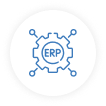Introduction
In today’s fast-paced educational environment, institutions face growing pressure to manage resources efficiently, streamline administrative workflows, and track student performance effectively. Traditional methods of managing data often lead to inefficiencies, errors, and wasted time.Enterprise Resource Planning (ERP) systems have emerged as a transformative solution for educational institutions. By centralizing operations, automating processes, and integrating data across departments, ERP enables administrators to make informed decisions, improve student outcomes, and enhance overall institutional efficiency.
This blog explores how ERP helps educational institutions manage resources and student data, with insights into implementation strategies and optimization through HubSpot-powered CRM solutions.
Understanding Why ERP in the Education Sector
ERP in education is designed to unify various operational functions such as admissions, finance, human resources, student information systems, and academic administration. By integrating these systems into a single platform, educational institutions can:
Reduce manual administrative tasks
Maintain accurate and updated records
Ensure compliance with regulations
Improve communication between departments
ERP systems tailored for education allow decision-makers to track resource allocation, monitor student performance, and plan strategic initiatives effectively.
Key Challenges in Educational Resource and Data Management
Educational institutions face unique challenges that make resource management complex:
Fragmented Systems: Multiple standalone applications create inefficiencies and data silos.
Manual Processes: Manual record-keeping is time-consuming and prone to errors.
Data Inaccuracy: Inconsistent or outdated student and staff data affects reporting and decision-making.
Limited Insights: Without real-time analytics, identifying trends in performance or resource utilization is difficult.
By implementing ERP, institutions can address these challenges, enabling better operational control and data-driven decision-making.
How ERP Transforms Institutional Operations
1. Centralized Data Management
ERP consolidates student, faculty, and administrative data in a single platform, eliminating duplication and ensuring data accuracy. Centralized data allows administrators to access real-time information, track student progress, and make informed decisions quickly.
2. Streamlined Administrative Workflows
Automating repetitive tasks such as admissions, scheduling, payroll, and fee management frees staff from manual processes. ERP systems standardize workflows, reduce errors, and improve overall operational efficiency.
3. Enhanced Student Performance Tracking
ERP systems provide detailed analytics and reporting on student attendance, grades, and learning outcomes. Educators and administrators can identify at-risk students, monitor progress, and implement timely interventions.
4. Improved Communication and Collaboration
By connecting departments, faculty, and students on a single platform, ERP enhances communication and collaboration. Notifications, alerts, and centralized portals ensure everyone stays informed and aligned with institutional goals.
Implementation Strategies for Educational ERPs
Successful ERP implementation requires careful planning and execution. Key strategies include:
Conducting a needs assessment to understand institutional requirements
Selecting an ERP system that aligns with academic and administrative objectives
Engaging stakeholders early to ensure adoption across departments
Establishing a phased implementation plan to minimize disruption
Providing comprehensive training and support for staff and faculty
These steps ensure that the ERP system delivers maximum value while remaining user-friendly for educators and administrators.
Enhancing ERP Efficiency with HubSpot-Powered CRM Solutions
Integrating HubSpot with your ERP system can significantly enhance operational efficiency. HubSpot CRM enables institutions to:
Automate lead and inquiry tracking for admissions
Segment and manage student communications
Monitor engagement with prospective students and parents
Provide personalized experiences through automated email workflows
By combining ERP and HubSpot CRM, institutions gain a unified view of students, improve engagement, and streamline recruitment and communication processes.
The Future of ERP in Educational Institutions
The future of ERP in education focuses on:
AI and Predictive Analytics: Anticipating student performance trends and operational needs
Cloud-Based Platforms: Providing accessibility, scalability, and cost savings
Mobile Accessibility: Enabling students and staff to access data anytime, anywhere
Integration with EdTech Tools: Connecting learning management systems, digital libraries, and online classrooms
Adopting these advancements allows institutions to remain agile, data-driven, and responsive to evolving educational demands.
How Syngrid Supports Digital Transformation in Education
Syngrid Technologies specializes in implementing ERP solutions for educational institutions. Our services include:
Strategic ERP consulting and needs assessment
End-to-end implementation and customization
Integration with HubSpot CRM for enhanced communication
Staff training and adoption programs
Ongoing support and optimization to ensure continuous improvement
with Syngrid, educational institutions can organize operations, improve data management, and enhance student outcomes effectively.
Conclusion
ERP systems empower educational institutions to manage resources efficiently, track student data accurately, and enhance overall operational effectiveness. When combined with HubSpot-powered CRM solutions, institutions can improve communication, engagement, and admissions processes.
With the right strategy, technology, and implementation with Syngrid Technologies, educational institutions can achieve long-term success, enhanced productivity, and improved student experiences.









